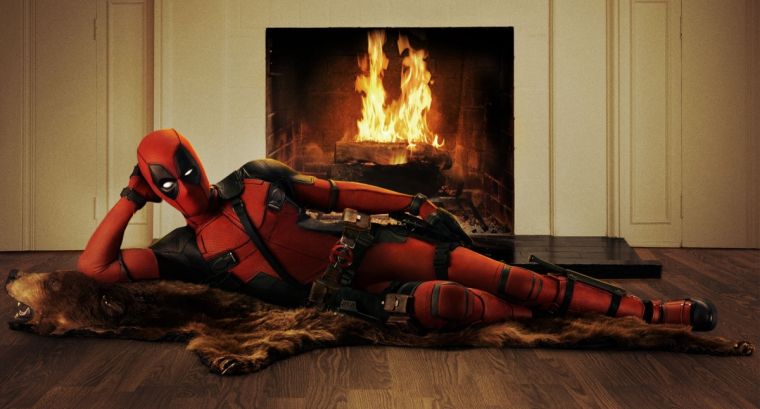Deadpool 2 review: Is evil beyond redemption?
Is it possible to have a Christian perspective on a film like Deadpool 2, aside from one which bemoans all the violence, sex references and very strong language? The age old question returns again and again; are elements of culture which flaunt so much ugly and unpleasant behaviour, and even try to turn it into virtue, even worth bothering with? Shouldn't we just spend our time pointing towards the light, rather than rummaging around in the darkness for a tiny speck of redemption?

These questions spun around my head as I sat through the second instalment of the unexpectedly-huge Deadpool franchise, a series about a wise-cracking, fourth-wall breaking anti-super-hero with a seriously wonky moral compass. The film follows on from the success of its predecessor, an origin story in which Ryan Reynolds' sweary, ethically-ambiguous mercenary becomes a sweary, ethically-ambiguous hero with a painfully ironic mix of terminal cancer and self-healing powers. In that film, Deadpool came to terms with his transformed body and fell in love (with a prostitute, obviously). This time, with love-of-his-life Vanessa seemingly out of the way, he's ostensibly learning about the value of family.
While that theme is definitely present, the film is really about three things: boundary pushing, laughter provoking, and superhero scrutinising. On the first point it arguably fails, actually; the violence and language are shocking, but if anything they're scaled back from the original film. After you've been watching a Deadpool film for any amount of time you become worryingly desensitised, and there certainly isn't much in the second film which manages to unsettle that.
The film is very funny in places, but at other times it's clearly trying too hard to live up the joke-machine-gun reputation of its predecessor; perhaps they just exhausted too many shocking taboos in the script to that film. Where it does up the ante is on referencing and deconstructing the superhero genre. Almost every significant Marvel character gets a nod at some point, and there are even a couple of rule-breaking moments where the agreed boundaries of Deadpool's universe are bent for the sake of a knowing laugh for the fans. There's certainly plenty here to keep comic nerds amused and smug, but there's also a bit of much-needed reflection on the glut of similarly-themed movies that Hollywood is now churning out at such a rapid rate.
Objectively speaking, it's a pretty good sequel, with the addition of a couple of good characters including Josh Brolin's indestructible time-travelling brute, Cable (not to be confused with Josh Brolin's indestructible time-travelling brute, Thanos), and Domino, played by newcomer Zazie Beetz, who becomes embroiled in an ongoing debate with the hero about whether being really lucky is actually a super power. To be honest though, it takes far too long to get going, and the first half feels like it's just trying too hard to recreate the magic of the 2016 original. It does finally hit its stride around the midpoint, thanks to the emergence of a clearer storyline involving Deadpool's attempts to save Hunt for the Wilderpeople's Julian Dennison from the clutches of Cable and his own self-destruction, and the second half of the film is a pretty well-rounded caper with a bit of a heart.
Because, when that theme about redemption and family is finally given space to emerge properly, it's actually rather interesting. Dennison's teenage character Russell has endured years of abuse at the hands of Eddie Marsan's religiously-motivated orphanage headmaster, and is scheming to use his newfound super-powers to take revenge. Deadpool knows that to do so will put him on a path to villainy, and so seeks to intervene, to turn him to good. Suddenly, the main character is no longer trying to shoot and slice his way through evil; he's actually trying to subvert and overcome it. Now of course, it's also done with a huge dose of knowing self-deprecation, but there's actually something quite profound about seeing the characters of thisfilm choose redemption and rehabilitation over straightforward destruction. They're not simply trying to dismiss evil and darkness, but to find the light hiding within it.
Which brings us neatly back to where we started. Is there really much point in engaging with Deadpool 2 when so many other films are starting from a perspective that is much more sympathetic with the values of Christianity? On the face of it, perhaps not, but I think it's interesting that even in a cinematic world that is so cynical, and takes such a low view of the world and of humanity, the writers and characters still gravitate toward a narrative about the light shining in the darkness. He'd utterly ridicule the suggestion, but in the end perhaps Deadpool ends up far more in sympathy with Jesus than he'd ever want to admit.
Martin Saunders is a contributing editor for Christian Today and the deputy CEO of Youthscape. Follow him on Twitter @martinsaunders











